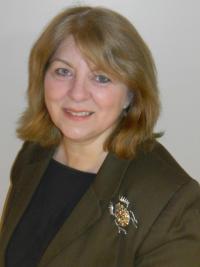We asked applicants for the NCSE Grand Canyon Teacher Scholarship to explain, in 500 words, what lessons or knowledge they expected to gain from rafting the Grand Canyon, to enrich their students’, colleagues’, and neighbors’ understanding of evolution, deep time, climate change, and the natural world. Here is part of scholarship winner Alyson Miller’s explanation of what she hopes to bring back from the Grand Canyon to her Nashua, New Hampshire, high school. Miller and Scott Hatfield will receive an all-expenses-paid trip down the Grand Canyon, thanks to generous donations from NCSE supporters.
 When Darwin was in Chile, he saw a church that had been torn apart by a recent earthquake and tidal wave. At that moment, he suddenly understood Lyell’s work on a visceral level. Earth is not stagnant. Earth changes. Most of the time, it’s changing so slowly that we don’t notice it, but every now and then we see it for ourselves and just “get it.’ Educators spend a lot of (their own) time reading for understanding and then trying to translate that learning into lessons that can be grasped by students who have not yet had world experiences. This is a time-honored process, and I’m quite sure that through his readings Darwin understood the academics of Lyell’s proposal, but then he used that book knowledge to connect seemingly random events—earthquake, seashells on mountaintops, fossils of extinct sloths—into the theory that connects every living thing on the planet. Would he have been able to make those connections using only books? I would argue that being out there, experiencing nature first hand, was a necessary component for developing his theory of evolution through natural selection.
When Darwin was in Chile, he saw a church that had been torn apart by a recent earthquake and tidal wave. At that moment, he suddenly understood Lyell’s work on a visceral level. Earth is not stagnant. Earth changes. Most of the time, it’s changing so slowly that we don’t notice it, but every now and then we see it for ourselves and just “get it.’ Educators spend a lot of (their own) time reading for understanding and then trying to translate that learning into lessons that can be grasped by students who have not yet had world experiences. This is a time-honored process, and I’m quite sure that through his readings Darwin understood the academics of Lyell’s proposal, but then he used that book knowledge to connect seemingly random events—earthquake, seashells on mountaintops, fossils of extinct sloths—into the theory that connects every living thing on the planet. Would he have been able to make those connections using only books? I would argue that being out there, experiencing nature first hand, was a necessary component for developing his theory of evolution through natural selection.
What Darwin did after he witnessed the earth-changing events was to share his experiences with the non-scientific community by publishing his popular journals, thus setting the stage for acceptance of the Origin of Species. I have no fantasy of becoming the next Darwin, but if I’m on NCSE’s Grand Canyon trip, then there’s a really good chance that I will develop a visceral understanding of deep time—and that I can take to the (local) masses.
Our school does not offer Earth Science, so it’s up to me to give students everything that I can, and I’ve never taken a geology, astronomy, or other earth science class. Everything I know, I’ve learned from books—and that’s not always enough. Lately, I’ve become very interested in how zircons are used to get samples of our early atmosphere, and my passion for understanding how a crystal box can be opened to release breaths of air that are millions of years old is similar to Darwin’s awe at the grandeur of life on a tangled bank. I’m a novice at geology, but I’m drawn to it because I know that there’s something there that I need to know. I don’t know what it is yet, but I know that it will add to the rich story of life on Earth that I share with my students. Help me find the piece that will unlock the next level of understanding that I need in order to inspire my students to embrace science.
